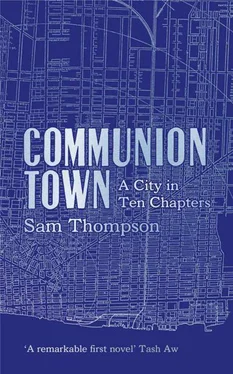That was the crux of it, Electra said: altered images. It was true that, with long and gruelling study, a practitioner of the Art could learn to retrieve all the lost junk and treasure hidden away in the attics of the mind, and to arrange everything in order: each image in its place, tidy and accessible. But it was also true that surprising things could happen in memory houses. To embody ideas in such a fashion was to imbue them with unpredictable life. They might move around when you were not there; they might change and grow in ways you had not expected.
She had noticed this already in her own small experiment. Further down the garden of her memory house, beyond the formal beds of ambition, she had one day been taken aback to discover another bed, in which grew a thorny tangle of grudges and resentments which she had not intended to plant. On closer examination she had been still more startled to recognise the forgotten wrongs that some of the older plants represented.
Later, too, when she looked at the Turkish rug in which she had patterned the network of her acquaintances, she found that the curls and interleavings suggested unexpected links between them. Guided by these hints, further investigation had revealed that, yes, those graduate students were working together on a furtive conference paper which came close to impinging on Electra’s own research; that, yes, those two members of the Senior Common Room enjoyed a relationship which was not purely professional. She had not been conscious of these useful facts until her memory house had brought them to her attention.
Such discoveries were mere toys, of course, and nothing that would rebuild the foundations of detection. But the larger possibility she had glimpsed held precisely such a promise. Consider the nature of detection, she said to Lazarus, this art to which we have dedicated ourselves. Is it not also an art of memory, in which we must retain every insignificant detail which might prove to be the key to a case? And does our discipline not have a special affinity with the ancient practice of the memory house, for where does the detective live, if not in a memory city , a city that is less a physical place than a world of codes and symbols? Does she not, in her mind, walk the streets at all times, in search of the meanings concealed there?
Lazarus saw what Electra was driving at, now, and he realised immediately that although it would require phenomenal work to accomplish, the rewards could be commensurate. If a detective could build, in his mind, a memory city which replicated the real city in every detail, then every mystery contained in that city would lie open to him: he would have mastered his discipline with a perfection otherwise unthinkable.
They talked through the night, growing bright-eyed as they developed the theme. Supposing it were possible, using the techniques of memoria artificialis , to construct an entire memory city, how would such a system of investigation work? The detective would become a perpetual flâneur within his own mind, forever wandering the pavements of memory to read the symbols and to encounter the shifting images through which the city would give up its secrets. To walk endlessly in imaginary streets would be a price to pay, no doubt, but in return one would gain powers of deduction nothing short of uncanny. Such a detective would foresee crimes before they took place, and would know criminals’ motives and hiding places before they knew themselves.
As the discussion became more excited, even fanciful, Lazarus kept one thought to himself. It was this: he was already some way towards the creation of the hallucinatory city that Electra posited. For all the hours he laboured over his books, Lazarus spent still more time walking the city, learning the mazes of its alleyways and slums, for he had always known that this was the only book that mattered to him. When he won fame, it would be for his readings of blood on brick, not ink on paper. He told himself that, in a way, the idea had belonged to him long before Electra had come to it. With her ancient codices and hermetic schemata, she had merely given him the tools to make it possible.
‘For Electra,’ Peregrine said, ‘that night of feverish student talk was the apex of the project. She delved some way further into her inquiry, but before long her rationalism prevailed. She concluded that the obstacles were too enormous and the rewards too uncertain to make the idea worth pursuing, and she diverted her energies to more productive lines of research. When she mentioned this to Lazarus, he agreed, and assured her that he, too, had dropped the notion of the memory city.
‘Years later, I learned that he had been lying.’
Steady drizzle fell as we left Belltown and hastened across the Old Quarter, trailing Inspector Nimrod through Twistgate to emerge into the stately public spaces of the Esplanade. In front of us, the facades of the Autumn Palace seemed to hang weightless, picked out by the floodlights. As we crossed the Parade we passed only a few night-owls on their way for a late stroll down the Mile, towards the cafés of Impasto Street or across the river to visit the headier attractions of Serelight.
Before us, overlooked by the Palace, lay the metro plaza. By day it would have been filled with stopping and starting trams, travellers embarking and disembarking, tourists poring over maps and locals pressing irritably through the crowd, but tonight the plaza was deserted except for a single tram, standing empty with its doors open and its interior lights making it a jointed yellow prism in the dark. And gathered around it, the familiar array: the saloon cars stopped at slewed angles, the slow-pulsing beacons, the bobbing torch beams, the reflective tape, the conferrals, the faces mingling nausea and boredom, the uniforms.
We approached the tram, and Inspector Nimrod paused to collect himself. Then, motioning his subordinates aside, he showed us the remains of Brutus Thorne, and the manner of the third murder.
‘One headache is where we’re going to place the scene of the crime,’ said the inspector. His laugh was a single thump on a rusty drum. He kept his eyes averted from what lay between the tracks at the rear of the tram. Peregrine, by contrast, was all attention: a critic formulating his first response to a challenging new piece.
At last he turned away.
‘Brutus was a fearless comrade,’ he said. ‘No two investigators could have differed further in style and temperament than Peregrine Fetch and Brutus Thorne; but many times we reached the same ends by discrepant means.’
Peregrine’s voice was steady, his face calm and unlined. I could not exactly name my thoughts as I observed this. I admired my mentor’s power to remain detached in the face of horrors, but as he confronted the grisly decease of an old friend for the third time in a single night, his composure untroubled, I experienced a fleeting chill.
Brutus Thorne had not subscribed to the principles of pure reason to which Peregrine was committed. He was a detective in another tradition. While Peregrine preferred to solve his clients’ puzzles through mentation alone, and took the deepest satisfaction in those cases which he was able to conclude without once rising from the Chesterfield in his consulting rooms, for Brutus the tools of investigation were muscle and grit. He got results by using his ears in the dive bars of the Liberties, and his fists in the alleyways outside; by means of coffee-fuelled stakeouts and rooftop chases. Peregrine, an expert at impersonation, could mingle in disguise with the city’s criminal element and never be detected, but Brutus Thorne needed no disguise at all, because he lived there.
In spite of their differing approaches to their work, the paths of the two men had crossed frequently in their shared campaign against the villainies of Lazarus Glass. Peregrine, for instance, had once devoted five months of archival research to the case of the Ship in the Mirror, and had been on the cusp of a solution when he read in the newspaper that Brutus Thorne had broken the case with a single well-placed hidden microphone. On the other hand, Brutus had once worked himself into the ground over the affair of the Green December, shaking down informants, tailing suspects and running phone-taps, only to discover that Peregrine Fetch had, weeks earlier, foreseen the whole sequence of events, and had simply been waiting for the would-be kidnappers to incriminate themselves before he informed the police of their intentions and whereabouts. And then again, the case of the Demolitionist’s Song would have remained a mystery to this day had Peregrine and Brutus not joined forces to expose the conspiracy. Thanks to Lazarus Glass, the felonious genius of the city, the rival detectives had become allies over the years.
Читать дальше
Конец ознакомительного отрывка
Купить книгу












